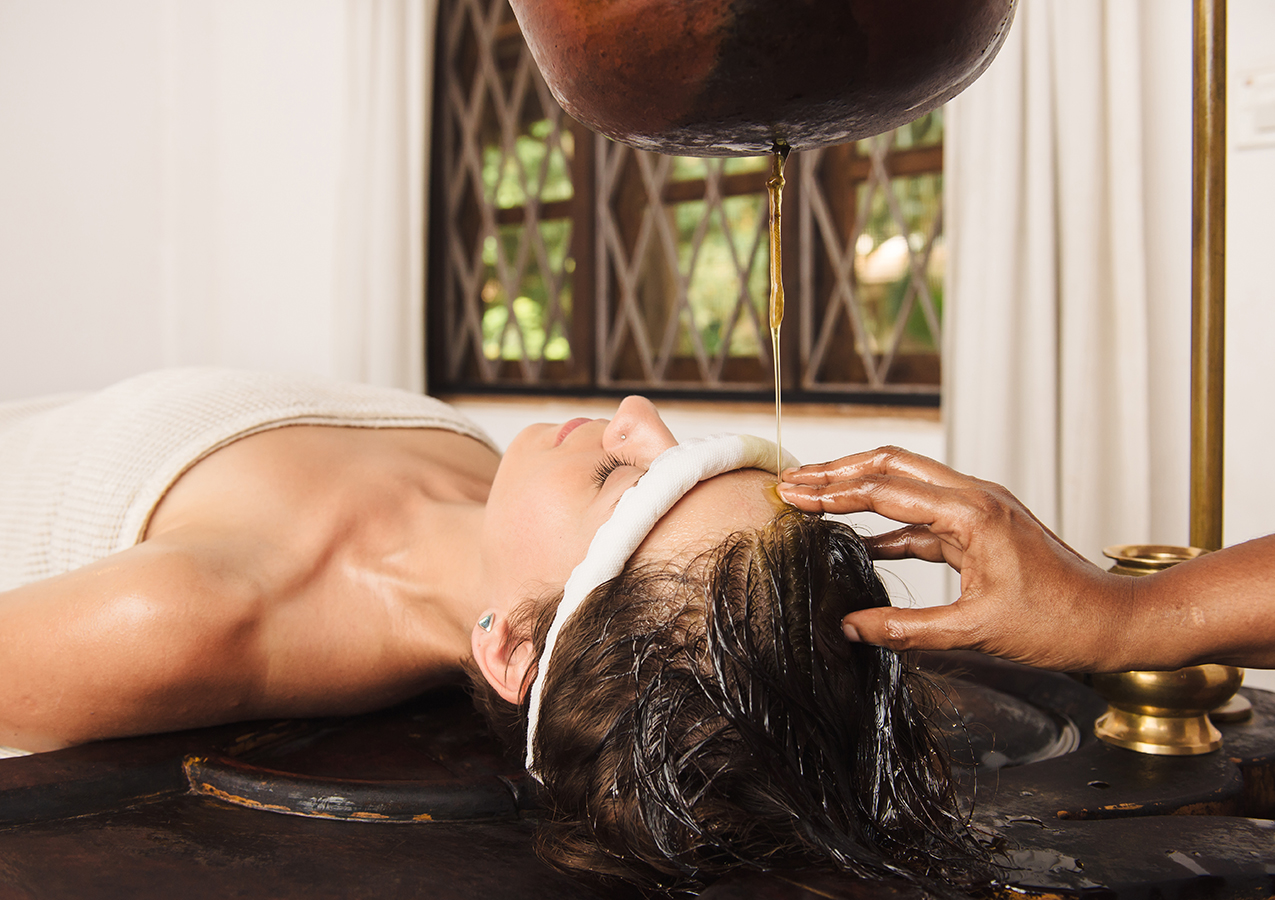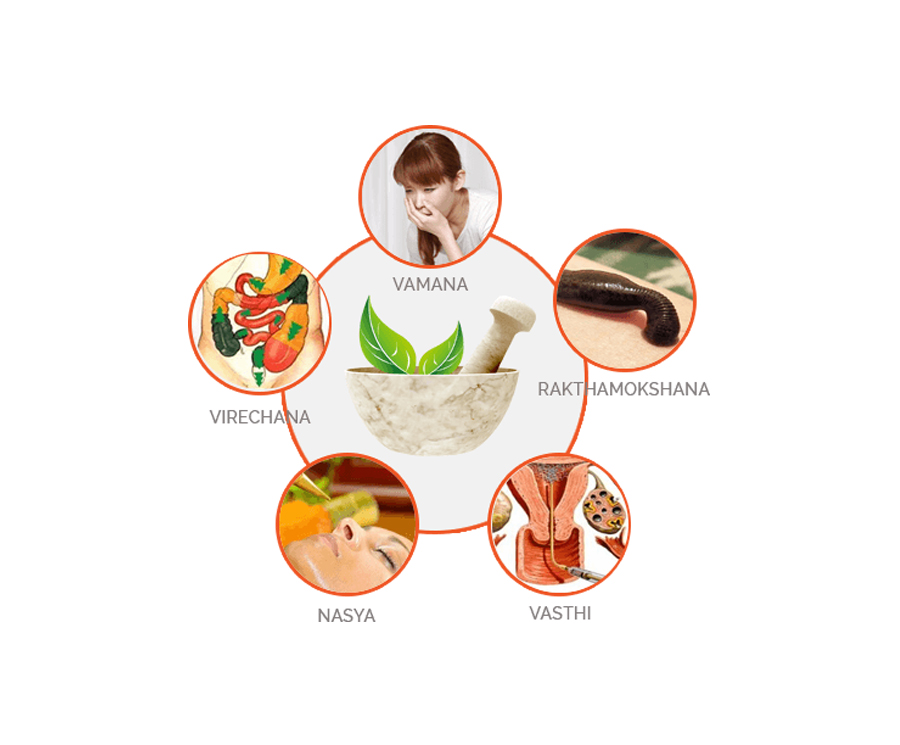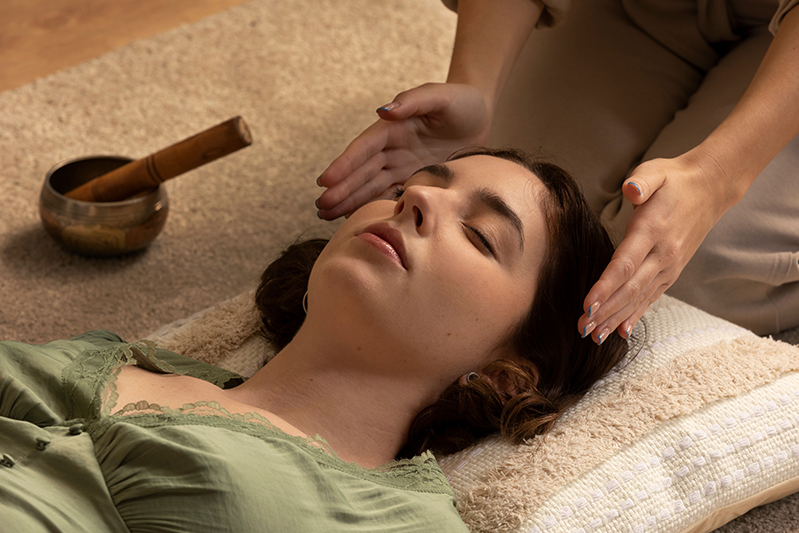
Ayurveda treatments are a system of traditional healing practices that originated in ancient India over 5,000 years ago. Ayurveda, which translates to "science of life" in Sanskrit, is a holistic approach to health and wellness that seeks to balance the body, mind, and spirit to achieve optimal well-being.
Ayurvedic treatments are personalized based on an individual's unique constitution, known as "Prakriti," and their current state of health, known as "Vikriti." The treatments focus on addressing the root cause of imbalances rather than merely alleviating symptoms.
Panchakarma is a traditional Ayurvedic detoxification and rejuvenation treatment that originated in India. It is a comprehensive therapeutic process aimed at balancing the body, mind, and spirit while removing accumulated toxins and imbalances. Panchakarma is considered one of the core healing modalities of Ayurveda, an ancient system of medicine.
The term "Panchakarma" is derived from two Sanskrit words: "Pancha," meaning five, and "Karma," meaning action. Hence, Panchakarma consists of five primary therapeutic actions or procedures that are customized based on an individual's unique constitution (Prakriti) and specific health concerns.

Vamana (Emesis therapy): This involves therapeutic vomiting to eliminate excess Kapha dosha from the upper respiratory and gastrointestinal tract. It is primarily used to treat conditions related to excessive mucus, congestion, and respiratory disorders.
Virechana (Purgation therapy): This involves the controlled administration of herbal purgatives to remove excess Pitta dosha from the body. It is beneficial for conditions like liver disorders, skin problems, and digestive issues.
Basti (Enema therapy): Basti involves administering medicated herbal oils or decoctions through the rectum to eliminate excess Vata dosha and toxins. It is useful in treating a wide range of Vata-related disorders and is considered one of the most important and powerful procedures in Panchakarma.
Nasya (Nasal administration): Nasya involves the instillation of medicated oils or herbal preparations into the nostrils to cleanse and treat the head and neck region. It is commonly used for sinus problems, headaches, and neurological issues.
Rakta moksha (Bloodletting therapy): This procedure involves the careful removal of a small amount of blood to eliminate impurities and toxins from the blood. It is mainly used to address blood-related disorders and skin conditions.
Panchakarma treatment is not a one-size-fits-all approach. The specific procedures and herbal formulations used in each Panchakarma treatment are determined based on an individual's dosha imbalance, overall health, and the guidance of an experienced Ayurvedic practitioner.
Panchakarma is considered a holistic approach to detoxification and healing, and it is commonly used for improving overall well-being, managing chronic conditions, and restoring balance and vitality in the body and mind. Before undergoing Panchakarma, it is essential to consult with a qualified Ayurvedic practitioner to assess your health condition and determine the most appropriate treatment plan for health.
In Ayurveda, wellness rejuvenation treatments aim to promote overall health, vitality, and longevity by balancing the body, mind, and spirit. These treatments focus on detoxification, relaxation, and revitalization of the body's natural healing abilities. Below are some common wellness rejuvenation treatments in Ayurveda:
A full-body massage using warm medicated oils to nourish the skin, improve blood circulation, relax muscles, and promote detoxification.
A continuous stream of warm medicated oil poured onto the forehead, which helps calm the mind, relieve stress, anxiety, and improve mental clarity.
Herbal steam therapy to induce sweating and open up the channels, promoting the elimination of toxins.
A unique treatment where warm medicated oil is poured over the body in a rhythmic manner while massaging, offering deep relaxation and rejuvenation.
A head and scalp massage using warm oils to reduce stress, promote sound sleep, and nourish hair and scalp.
Administration of medicated oils or herbal powders through the nostrils to clear the nasal passages, improve breathing, and alleviate specific head-related issues.
A herbal powder massage that exfoliates the skin, aids in weight loss, and improves skin texture.
A rejuvenating treatment for the eyes using medicated ghee, which helps reduce eye strain, dryness, and fatigue.
Warm medicated oil treatment applied to the lower back to alleviate back pain and strengthen the muscles.
Similar to Kati Basti but applied to the neck area for neck-related problems.
A treatment where warm medicated oil is pooled over the knee joint to relieve knee pain and stiffness.
A treatment involving a cap-like structure on the head, filled with warm oil, to alleviate neurological issues and promote mental clarity.
Comprehensive detoxification and rejuvenation treatment, including Vamana, Virechana, Basti, Nasya, and Rakta Moksha.
Herbal therapies and tonics used to boost immunity, enhance vitality, and promote longevity.
Daily and seasonal routines recommended in Ayurveda to maintain balance and well-being.
These wellness rejuvenation treatments in Ayurveda are designed to restore and maintain harmony within the body and mind, leading to improved health, increased energy, and a sense of overall well-being. It is essential to consult with a qualified Ayurvedic practitioner to determine the most suitable treatments based on your individual constitution and specific health needs.
Soundarya Vardhini is an Ayurvedic beauty therapy that focuses on enhancing the natural beauty and radiance of the skin. It is a rejuvenating treatment that aims to nourish, tone, and revitalize the facial skin. The treatment typically includes cleansing, exfoliation, steam therapy, facial massage, application of a herbal face pack, relaxation, removal of the face pack, and the application of herbal mists or toners and moisturizers.
It is a natural and non-invasive treatment suitable for all skin types, and the ingredients used in the treatment are chosen based on individual skin types and concerns.
As with any Ayurvedic treatment, it is essential to undergo Soundarya Vardhini under the guidance of a qualified and experienced Ayurvedic practitioner or beauty therapist to ensure it is tailored to your specific skin needs and to achieve optimal results.
Mukha Soundaryavardhini
Mukhalepam
Ayurveda facial
Ayurveda Fruit facial
Keshini
Bhasini


Our Services
Skin care
Hair Care
Dental
Ayurveda
Physiotherapy